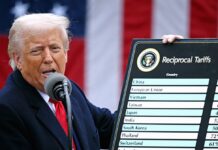The answer, Treasury Secretary Steven Mnuchin and top White House economic adviser Larry Kudlow concluded Wednesday, is not much without congressional action.
But the fact that the administration is still mulling the move — which provides the biggest after-tax income boost to the top 1 percent of earners, according to an analysis by the nonpartisan Tax Foundation — gives an insight into a Trump team that remains scattered in its response to the pandemic-fueled economic crisis.
If the administration’s goal is to help the most vulnerable, “this is not the right tool,” Tax Foundation senior policy analyst Garrett Watson says. “For the most part, it does benefit higher earners, people not as likely to be hurting as much right now. And it’s not very fast.”
Hopes of advancing a major legislative package of emergency economic relief remain on ice as talks stall. In the absence of that aid, Trump officials are struggling to refine unilateral actions the president unveiled Saturday that have presented a number of implementation problems.
The administration’s efforts to end-run Congress are colliding with legal and practical complications.
Take Trump’s bid to continue federal support for unemployed workers after their $600 weekly benefit expired at the end of last month. The president first proposed offering workers $400 a week, with states bearing $100 of that cost. But the administration has been forced to reconsider after cash-strapped states indicated they couldn’t participate, with a bipartisan array of governors declaring the plan unworkable.
And White House officials now are offering conflicting alternatives. “By Tuesday evening, at least five contradictory versions of this parallel benefit system had been communicated by various Trump officials, according to a running tally from Georgetown law professor David Super,” columnist Catherine Rampell writes. “And if the original design was in a statutory gray area, Super says, the revised versions waiving additional state contributions are ‘not remotely legal.’ ”
Per Rampell,”That’s because the 25 percent ($100) state funding match included in Trump’s executive action wasn’t there just for kicks. It was there because it’s required under the law Trump cited as giving him authority to create this benefit program: the Stafford Act.”
Trump’s other attempt to alter taxes by fiat — by suspending collection of the payroll tax — is hitting its own snags.
The president’s push requires employers to opt in and stop taking 6.2 percent out of their workers’ paychecks from September through the end of the year. But then they would be on the hook to withhold extra money next year to repay back taxes.
Given that headache, “few employers are likely to take advantage of the deferral,” argues Alan Viard, a resident scholar at the right-leaning American Enterprise Institute, concluding the proposal therefore “looks like a whole lot of nothing.”
Mnuchin laid out a different possibility: That Trump will seek to forgive those deferred payroll tax collections at the end of the year. “So he’ll go back to Congress when he wins the election and ask Congress to have this money forgiven and have the Social Security trust fund fully topped up so in no way does this impact Social Security,” the treasury secretary said in a Wednesday interview on Fox Business.
And the president had a simple answer for how the government would make up for the lost revenue:
The answers have not satisfied the U.S. Chamber of Commerce, which wrote Mnuchin on Wednesday asking for more clarity about the plan. Not only is the initiative “surrounded by uncertainty as to its application and implementation, it creates a substantial tax liability for employees at the end of the deferral period,” Caroline Harris, the business lobby’s chief tax policy counsel, wrote. Without congressional action to forgive the deferred taxes, she wrote the plan “threatens to impose serious hardships on employees.”
Officials are offering confusing messages on Trump’s move to extend the expired moratorium on evictions.
Kudlow acknowledged Trump’s order on evictions accomplishes less than advertised. As he told Fox Business on Wednesday, “It’s not quite an eviction moratorium, but it’s certainly eviction protection.” Indeed, as we noted here earlier this week, the president’s move over the weekend merely directs the Department of Health and Human Services and the Centers for Disease Control and Prevention to “consider measures” to prevent evictions.
But Trump insisted in a Wednesday evening news conference that strapped renters and homeowners won’t lose the roofs over their heads. “I want to make it unmistakably clear that I’m protecting people from evictions,” he said.
Trump and his team are talking up the strength of the rebound. Top Fed officials see it differently.
With its emergency response snarled on multiple fronts, administration officials are downplaying the urgency of action. The president touted a recovery he described as a “strong V” — a view many economists say they don’t share. The economy, he said, is “coming back very strongly. It’s coming back at a level that’s far greater than anybody anticipated, and we’re very proud of that.”
And Kudlow questioned the need for more congressionally-approved emergency relief. The president’s top economic hand said he doesn’t think the economy “particularly” needs more spending from Washington. “I think you need targeted money,” he told Fox Business, but “I don’t think the economy is going to rely solely on this.”
Yet top Federal Reserve officials said neither the public health crisis nor the economic shock it has precipitated are under control. Boston Fed President Eric Rosengren said the inability of states to curb new coronavirus outbreaks will prolong the economic downturn, the Wall Street Journal’s Nick Timiraos reports.
And San Francisco Fed President Mary C. Daly said Congress “will have to build a bigger bridge…now that we know the coronavirus is not behind us and now that we’re in this for a longer period of time than we hoped.”
Market movers
Stock market flirts with all-time highs.
The S&P 500 touched a new record Wednesday before edging down. “The S&P 500 popped above its highest-ever closing level, and stands poised to erase its bear-market plunge in record time. But as stirring as the recovery has been, it’s also a case study in how stock benchmarks can be misleading when it comes to the experience of investors at large,” Bloomberg’s Vildana Hajric, Lu Wang and Claire Ballentine report.
“It took just 175 days for the index to go from peak to trough to peak, a recovery that has come faster than any comparable one in the past. The previous 12 cycles that saw stocks recover from a drop of at least 20% took an average of four years. Since bottoming in March, the S&P 500 has risen about 50%, with more than 40 of its members doubling. More than $12 trillion dollars of share value that vanished is now all but restored. The S&P 500 rose as much as 1.6% to 3,387.89, briefly surpassing its Feb. 19 closing record. It pulled back in the final half hour of trading to end at 3,380, 0.2% shy of the all-time high.”
Economists expect more than a million new jobless claims. “Unemployment claims likely held steady at historically high levels last week, an indication companies continued to lay off workers nearly five months into the coronavirus pandemic,” WSJ’s Sarah Chaney reports.
“Economists estimate initial unemployment claims fell slightly to 1.1 million last week, which would mark 21 straight weeks claims logged in above 1 million. New applications for unemployment benefits declined in the prior week and are down significantly from a peak of near 7 million in March, but still nearly twice the pre-pandemic record of 695,000.”
Coronavirus fallout
From the U.S.:
- The deadliest day of summer: “The United States logged nearly 1,500 coronavirus-related deaths on Wednesday, marking the deadliest day of the summer so far. The count of fatalities is the highest since mid-May, signaling that the United States does not have the pandemic under control despite stabilizing case numbers,” Antonia Noori Farzan reports.
- Florida governor compares reopening schools to killing Osama Bin Laden: Just as the SEALs surmounted obstacles to bring Osama bin Laden to justice, so too would the Martin County School system find a way to provide parents with a meaningful choice of in-person instruction or continued distance learning,” Gov. Ron DeSantis (R) said after pointing out that Martin County Superintendent Laurie Gaylord had compared reopening to a “Navy SEAL operation.”
- Newspapers abandon offices: “Tribune Publishing has decided to save money by giving up its newsroom space in New York, Allentown, Annapolis, and Orlando. Other publishers have done the same, or are thinking about it. Television networks and other types of media companies are also expected to shrink their footprints in whatever the post-pandemic ‘new normal’ is,” CNN’s Brian Stelter reports.
More from the corporate front:
- More than 200 aviation companies double-dipped into federal pandemic payroll aid: “The companies include a Chicago catering firm under investigation by Democrats in Congress for laying off almost 900 workers this spring; an Ohio aircraft maintenance business that closed an office and put 52 people out of work just days after securing a loan of at least $5 million under one of the programs; and a Wisconsin airline that has warned of hundreds of temporary layoffs come fall,” Ian Duncan and Lori Aratani report.
- Lyft reports dramatic revenue drop of 61 percent: The ride sharing company did have “a glimmer of hope for its core ride-hailing business with monthly rides increasing 78 percent in July, as compared to April,” CNBC’s Lora Kolodny reports.
- REI plans sale of unused eight-acre headquarters campus: “Employees who would have worked at the campus, which media reports had called the ‘most outdoorsy HQ ever’ and ‘like summer camp for grown-ups’ for its rooftop terraces, courtyard full of native plants and large sliding doors to the outside, had not yet taken occupancy,” Jena McGregor reports.
Around the world:
- India overtakes Britain for fourth-largest death toll: “India now has almost 2.4 million confirmed cases of the infection and at least 47,000 deaths, according to John Hopkins University. In the last 24 hours, a further 942 deaths were reported. Britain remains the worst-hit country in Europe,” Jennifer Hassan reports.
- Britain announces plans to hire “head of pandemic preparedness”: The announcement of the role “comes months after the pandemic hit Britain the hardest in Europe, claiming nearly 47,000 lives,” Jennifer Hassan reports from London. “Prime Minister Boris Johnson and Health Secretary Matt Hancock have been heavily criticized for their handling of the pandemic, which has ravaged the country over the last six months.”
- U.N. head warns of worse conflicts and new ones: “While there have been many peaceful protests around the world, at least 23 countries have postponed elections or referendums, [U.N. Secretary General António] Gutterres said. He called for the Security Council to take ‘concrete action’ toward enacting peace initiatives around the world, warning that worsening socioeconomic realities were of particular concern,” Antonia Farzan reports.
When superpowers collide
Mexico makes a pitch for business as U.S.-China relations worsen.
Some companies were starting to shift production before the pandemic: “The Mexican government calls it a ‘relocation strategy’ — a campaign to convince companies that they’d be safer bringing production closer to the U.S. market, to a country with a newly signed North American trade deal and a warmer relationship to the U.S. government,” Kevin Sieff reports this morning.
“Aside from trade tensions, firms complained about intellectual property concerns, rising labor costs and political instability. In February, the consulting firm Gartner found that 33 percent of global supply-chain leaders had either shifted sourcing and manufacturing activities out of China or planned to in the next three years.”
- Mexican President Andrés Manuel López Obrador sees the pitch as vital to the economy: López Obrador views “increasing exports as the primary way to extract the country from a deepening recession. Even before the pandemic, the economy was stagnating. The International Monetary Fund expects the country’s GDP to decline this year by 10.5 percent.”
Confucius Institutes draw U.S. scrutiny: “The Trump administration is increasing scrutiny of a long-established Chinese-government funded program that’s dedicated to teaching Chinese language and culture in the U.S. and other nations, the latest escalation of tensions with Beijing,” Bloomberg News’s Peter Martin reports.
“The State Department plans to announce as soon as Thursday that Confucius Institutes in the U.S. — many of which are based on college campuses — will need to register as ‘foreign missions’ … The designation would amount to a conclusion that Confucius Institutes are ‘substantially owned or effectively controlled’ by a foreign government. That would subject them to administrative requirements similar to those for embassies and consulates.”
Campaign 2020
Sen. Kamala Harris wants to give Americans $2,000 a month during the pandemic.
Biden favors a much more measured approach: “Harris has been more aggressive in outlining how the federal government should respond to the economic crisis, introducing both the bill for monthly checks and a proposal to ban evictions, foreclosures, rent increases and utility shutdowns for the duration of the pandemic,” Jeff Stein reports of the differences between the former vice president and his running mate.
“Harris’s positions as a U.S. senator and during her 2020 presidential run may pose a challenge for the Biden campaign, which has been wary of moving too far left on economic policy announcements as it tries to maintain its polling lead over [Trump]. A spokesman for the Biden campaign declined to comment on whether the campaign supports Harris’s effort to provide $2,000 monthly checks throughout the crisis. The spokesman also declined to comment on Harris’s ‘RELIEF Act,’ which in addition to banning evictions and foreclosures would bar landlords from reporting unpaid rent to credit agencies.”
Pocket change
Uber CEO says its service will probably shut down temporarily in California.
The ride share company continues to fight with the state over how to classify drivers: “Uber and rival Lyft both have about a week left to appeal a preliminary injunction granted by a California judge on Monday that will prohibit the companies from continuing to classify their drivers as independent workers. Following the order will require Uber and Lyft to provide benefits and unemployment insurance for workers,” CNBC’s Lauren Feiner reports.
“California’s attorney general and three city attorneys brought the lawsuit against the companies under the state’s new law, Assembly Bill 5, that aims to provide benefits to gig workers core to a company’s business by classifying them as employees.”
- Key quote: “If the court doesn’t reconsider, then in California, it’s hard to believe we’ll be able to switch our model to full-time employment quickly,” Dara Khosrowshahi told MSNBC’s Stephanie Ruhle.
Goldman Sachs vies for GM’s credit card: “The Wall Street firm is among a small number of bidders for the auto maker’s credit-card business, which has about $3 billion in outstanding balances,” WSJ’s Liz Hoffman and AnnaMaria Andriotis report.
“In their pitches to GM, Goldman and Barclays have pushed the idea of cars as e-commerce portals … an effort that the auto maker itself has embraced. GM was the first major car company to allow drivers to order food, pay for gas and book hotel stays from dashboard touch screens, and it signed up merchants including Dunkin’ Brands Group Inc. and Shell.”
Media titan Sumner Redstone dies at 97: “Sumner Redstone, a combative and daring dealmaker who in his 60s turned his family’s movie theater chain into one of the world’s largest media empires, with holdings that included Paramount Pictures film studios, CBS, MTV and the publishing house Simon & Schuster, died Aug. 11 at his home in Los Angeles,” David Marino-Nachison and Adam Bernstein write in his Post obit.
“In recent years, as the mogul’s mental and physical decline became increasingly apparent, legal and public-relations battles erupted among his presumed successors, members of the family and an array of other hangers-on. All had a stake in inheriting chunks of his $40 billion business empire, his personal fortune or both.
- The scene at his 90th birthday was a testament to his power: Actor [Tom] Cruise “along with former vice president Al Gore, financier and ‘junk bond king’ Michael Milken and assorted Hollywood luminaries” all showed up. “Tony Bennett crooned to Mr. Redstone, crediting him with helping revive the singer’s career by giving him a presence on MTV in the 1990s.”
Chart topper
Millennials are feeling cautious again about resuming pre-pandemic activities, data from Morning Consult shows. Via Charles Schwab & Co. chief investment strategist Liz Ann Sonders:
Daybook
- The Labor Department releases the latest weekly jobless claims
- DraftKings is among the notable companies reporting its earnings








